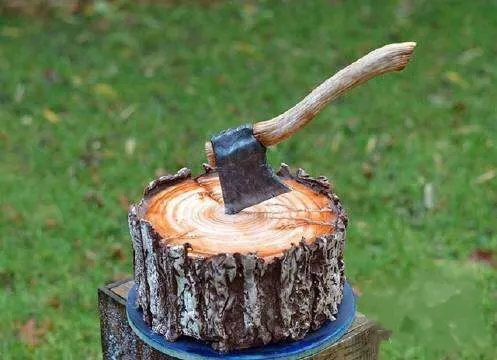A woodcutter's eagerness
《伐木磨刀》
Once upon a time, a very strong woodcutter applied for a job offered by a timber merchant and he got it. The pay was really good and so were the working conditions. For these reasons, the woodcutter was determined to do his best.
從前,一位非常強(qiáng)壯的伐木工在一家木材商找到了一份伐木的工作。這工作的薪酬和工作條件都非常不錯。于是,伐木工決心把工作做到最好。
His boss gave him an axe and showed him the area where he was supposed to work. The first day, the woodcutter brought 18 trees back to the boss, which he all had cut down himself.
入職后,老板給了這位伐木工一把斧頭,并帶他看了將要工作的地方。工作的第一天,這位伐木工就給老板帶回了18棵樹,而且這18棵樹都是他自己砍伐的。
"Congratulations," the boss said. "Go on that way!" Very motivated by the words of his boss, the woodcutter tried harder the next day, but he could only bring back 15 trees. The third day he tried even harder, but he could only bring 10 trees back. Day after day he was bringing less and less trees.
“干得不錯,”老板說,“就這樣繼續(xù)努力!”得到老板的肯定,伐木工第二天的工作更來勁了,不過他卻只帶回了15棵樹。第三天,他工作得更加努力,卻只帶回了10棵樹。日復(fù)一日,他帶回來的樹越來越少。
"I must be losing my strength", the woodcutter thought. He went to the boss and apologized, saying that he could not understand what was going on. "When was the last time you sharpened your axe?" the boss asked. "Sharpen? I had no time to sharpen my axe. I have been very busy trying to cut down trees..."
伐木工心想:“我肯定是力氣越來越小了”。于是,他去找老板道歉,解釋說他自己也不明白怎么回事。“你最后一次磨斧頭是什么時候?”老板問道。“磨斧頭?我沒有時間磨斧頭。我一直在忙著努力砍樹......”
Our lives are like this. We sometimes get so busy that we don't take time to sharpen the "axe". In today's world, it seems that everyone is busier than ever, but less happy than ever.
這樣的場景也同樣會出現(xiàn)在我們的日常生活中。我們有時會非常忙碌,以至于我們不愿不花費(fèi)時間去“磨斧頭”。當(dāng)今世界,似乎每個人都比以前更加忙碌,日子過得卻不像以前那樣快樂。
Why is that? Could it be that we have forgotten how to stay "sharp"? There's nothing wrong with activity and hard work. But we should not get so busy that we neglect the truly important things in life, like developing our personal life, spending more time to our family, taking time to read etc.
為什么會這樣?難道是我們忘記了如何“讓斧頭保持鋒利”?我們?yōu)榱松疃疾β挡]有什么不對。但,我們不應(yīng)該忙到忽視我們生活中真正重要的事情,比如:過好我們自己的小日子、發(fā)展志趣、多花些時間陪伴家人、花時間讀讀書等等。
We all need time to relax, to think and meditate, to learn and grow. If we don't take the time to sharpen the "axe", we will become dull like the axe of the woodcutter.
我們每個人都需要時間去放松、思考、學(xué)習(xí)和成長。如果我們不花時間去“磨斧頭”,我們就會像伐木工的斧頭一樣變得效率低下。

Keep the roots stronger
《養(yǎng)花養(yǎng)根》
Once upon a time, there were two neighbours. One of them was a retired teacher and another was an insurance agent who had a lot of interest in technology. Both of them had planted different plants in their garden. The retired teacher was giving a small amount of water to his plants and didn't always give full attention to them, while the other neighbour had given a lot of water to his plants and looked after them very well.
從前,有這么兩個互為鄰居的人。他們一個是退休教師,另一個是一位對科技非常感興趣的保險代理人。他們二人都在各自的花園里種植了各種花卉。退休教師只是每天給他的花卉澆少量的水,不怎么給予它們太多關(guān)注。而那位保險代理人,則每天給他的花卉澆大量的水,并且對它們照顧得非常好。
The retired teacher's plants were simple but looked good. The insurance agent's plants though, were much fuller and greener. One night, there was heavy rain and wind due to a storm. The next morning, both neighbours came out to inspect the damage in their garden.
退休教師的花卉長勢一般,但看起來還不錯。而保險代理人的花卉則更加飽滿、更加鮮綠。一天晚上,一場風(fēng)暴夾雜著大雨和狂風(fēng)來襲。第二天早上,他們兩人都出來查看各自花園的損失情況。
The neighbour who was an insurance agent saw that his plants had come off their roots and were totally destroyed. But, the retired teacher's plants were not damaged at all and were standing firm.
保險代理人發(fā)現(xiàn)自己的花卉都被連根拔起、完全摧毀了。但,退休教師的花卉卻都立得很穩(wěn),且完好無損。
The insurance agent was surprised to see this, so he went to the retired teacher and asked, "We both grew the same plants, I actually looked after my plants better than you did for yours, and I gave them more water. Still, my plants came off their roots, while yours didn't. How is that possible?"
保險代理人看到這一場景非常驚訝。于是,他向退休教師問道:“我們倆種的是同樣的花卉,而且,實(shí)際上,照顧花卉方面,我做得比你更好,澆水也比你更多、更頻繁。盡管如此,我的花卉卻被風(fēng)暴連根拔起了,而你的卻一點(diǎn)事兒沒有。這怎么可能?”
The retired teacher smiled and said, "You gave your plants more attention and water, but because of that they didn't need to work themselves to become rooted and strong. You made it easy for them. While I gave them just an adequate amount of water and let their roots search for more. And, because of that, their roots went deeper and that made their position stronger. That is why my plants survived".
退休教師笑著回答說:“你的確給予了你的花卉更多的關(guān)照,澆了更多的水,但正是因?yàn)檫@樣,它們不需要自己努力發(fā)展根系,變得強(qiáng)壯。你讓它們的生存變得非常容易。而我只給我的花卉澆了足夠生存的水,這也讓它們的根系有機(jī)會去自己尋找更多的水分。而且,正因?yàn)槿绱耍鼈儾抛兊酶畹俟獭_@就是我的花卉能夠從這場風(fēng)暴中幸存下來的原因。”
Moral: If everything you need and want is given to you in life, you will not understand the hard work it takes to earn these things. You will not learn to work yourself and not learn to respect people who need to work for their needs and wants. And sometimes it's best to guide others instead of giving them what they need right away. We all need to learn how to walk, but follow and discover your own path. This story contains advise for good parenting in particular, where children are like plants.
寓意:如果你被給予了生活中需要和想要的一切東西,你就不會明白得到這些東西需要付出艱辛的努力;你不會學(xué)會如何去自己努力工作,也不會學(xué)會去尊重那些需要為自己的需求而努力工作的人。有的時候,對別人最好的幫助,不是去馬上滿足他們的需要,而是給出他們正確的引導(dǎo)。我們都需要學(xué)習(xí)如何自己行走,同時跟隨并探尋自己的人生路徑。這則故事在父母如何養(yǎng)育孩子方面給我們提出了很好建議,生活中我們的孩子其實(shí)就像故事中的花卉。











